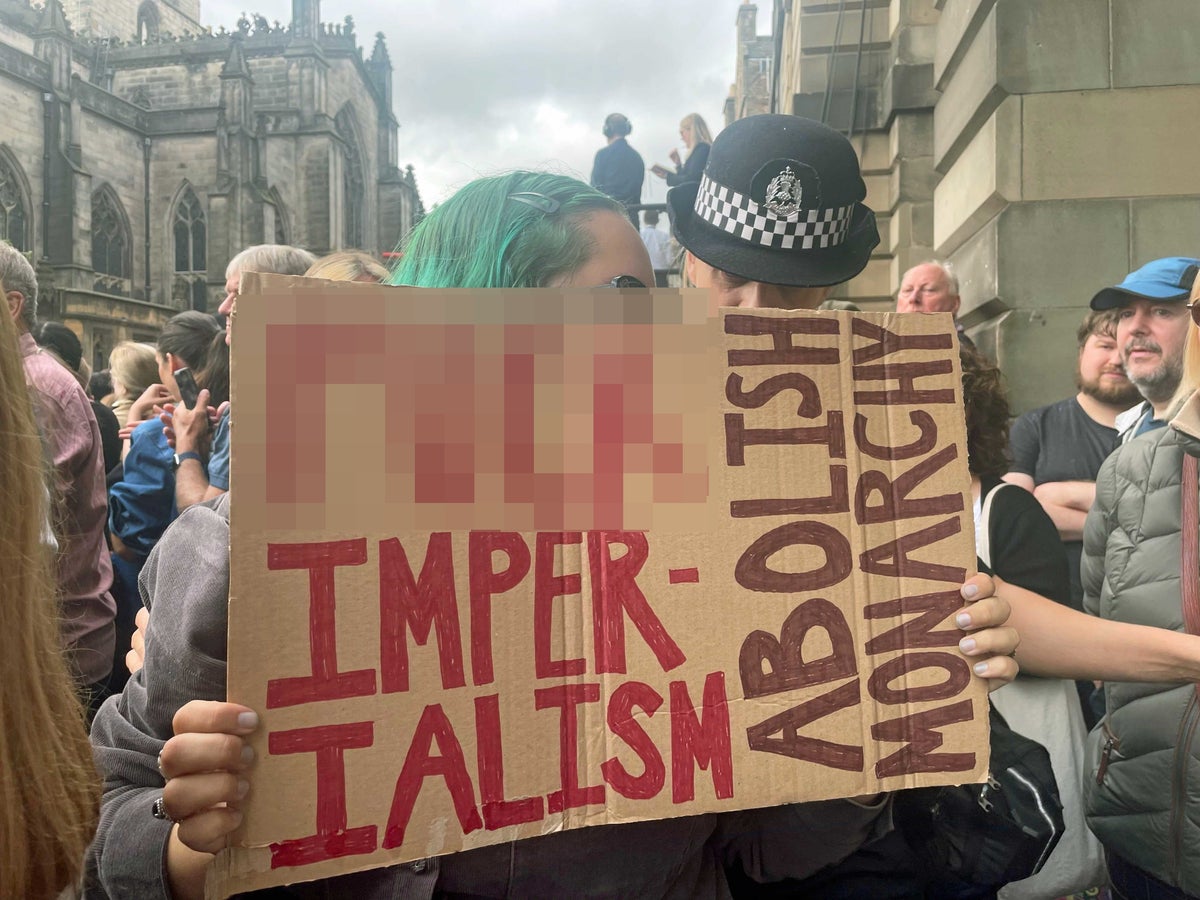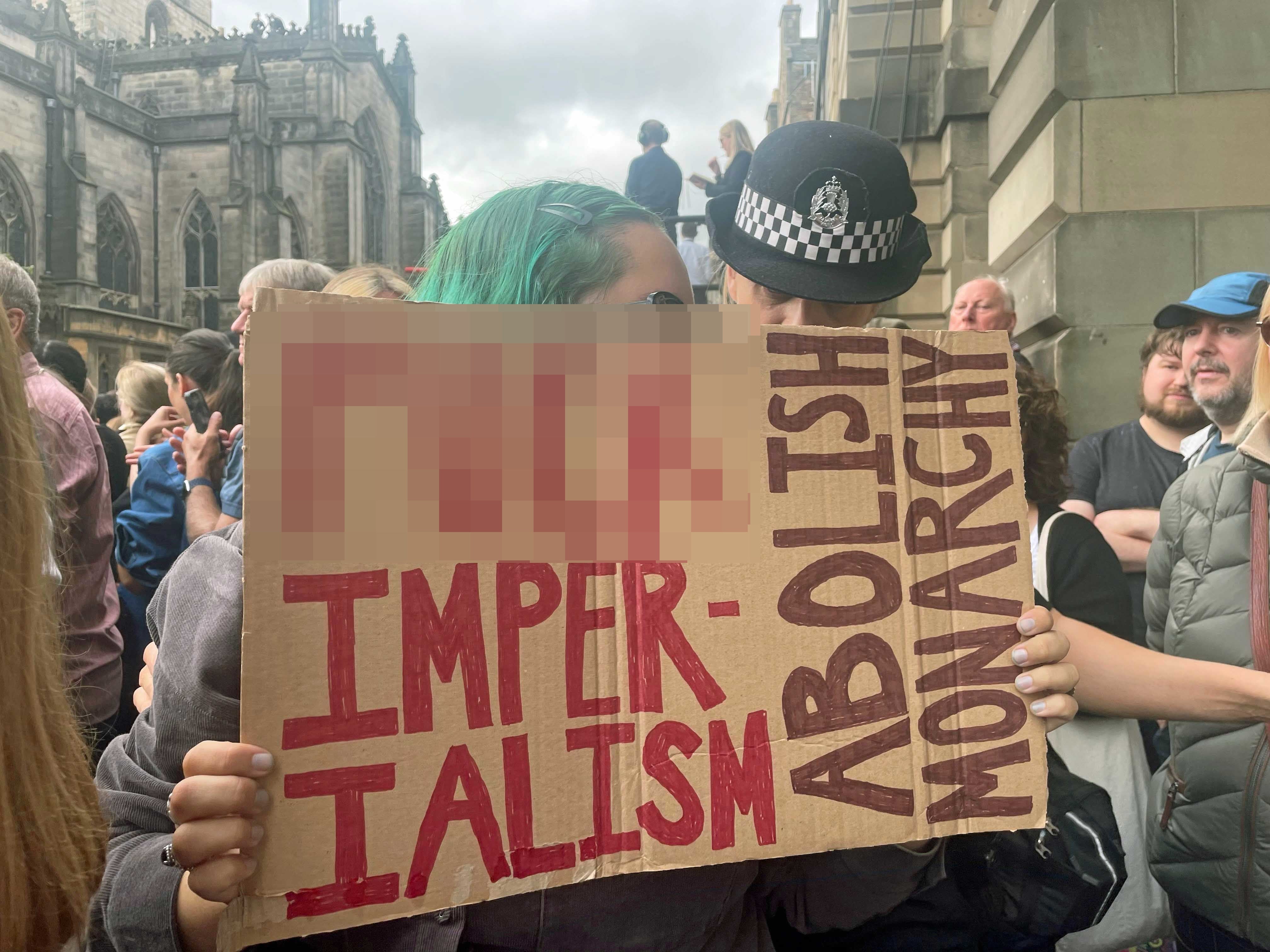
A woman who held an “abolish monarchy” sign at a proclamation ceremony for King Charles III in Edinburgh has been charged with a criminal offence amid a series of arrests that have alarmed human rights groups.
A heckler who shouted at Prince Andrew as the Queen’s funeral cortege passed up Edinburgh’s Royal Mile on Monday afternoon is among the protesters and republican activists who have been targeted by police.
Police Scotland said a 22-year old man was “arrested in connection with a breach of the peace”, after footage showed him being dragged to the ground and telling an officer he had done nothing wrong.
Another arrested demonstrator called the response an “outrageous assault on democracy” and Liberty accused police of exercising broad powers in a “heavy-handed and punitive way”.
At least two arrests were made at proclamation ceremonies on Sunday, while police were seen moving a woman holding a placard saying “not my King” near the Houses of Parliament on Monday morning.
Asked about the incidents in a daily press conference, the prime minister’s official spokesperson said: “This is a period of national mourning for the vast vast majority of the country, but the fundamental right to protest remains the keystone of our democracy.”
Police Scotland said a 22-year-old woman had been arrested outside St Giles' Cathedral in Edinburgh on Sunday “in connection with a breach of the peace”.
“She was charged and was released on an undertaking to appear at Edinburgh Sheriff Court at a later date,” a spokesperson added.
The woman was holding a sign reading “f*** imperialism, abolish monarchy”, but the sign is not understood to be the reason for her arrest.
She was seen in the crowd moments before the official proclamation of the new King in the Scottish capital and was taken away by police.
Some members of the crowd applauded and told the woman to “have some respect”, while others shouted “let her go, it’s free speech”.
Other republican protesters were heard booing during the event and shouting “republic now”.
In Oxford, a man was arrested under the Public Order Act for alleged behaviour causing “harassment, alarm or distress”.

Symon Hill, 45, told The Independent he called out “who elected him?” when Charles III was officially proclaimed King.
“I remained quiet in the first part of the proclamation, concerning the death of Elizabeth,” he added in his blog.
“I doubt most of the people in the crowd even heard me. Two or three people near me told me to shut up. I didn’t insult them or attack them personally, but responded by saying that a head of state was being imposed on us without our consent.”
Mr Hill said he was initially “told to be quiet” by security guards, before police officers approached, arrested and handcuffed him.
He heard some people asking police what they were doing and saying he “had a right to his views”, but was taken to a police van and told he could be charged.
Mr Hill called the incident an “outrageous assault on democracy” and that he did not believe anyone could have felt harassed or distressed by his actions, adding: “The police abused their powers to arrest someone who voiced some mild opposition to a head of state being appointed undemocratically.”
Journalist Alan White, who attended the proclamation ceremony, wrote on Twitter that while some members of the crowd “told him to shut up, absolutely no one that I saw asked for the police to get involved”.
The Politics Home editor said that possible harassment or distress, “was not borne out by what I witnessed”.
Mr Hill said officers initially told him he was arrested under the controversial new Police, Crime, Sentencing and Courts Act, which enabled police to ban single-person protests and those deemed too noisy.
But a spokesperson for Thames Valley Police said he was arrested under section 5 of the Public Order Act, which contains an offence of using threatening or abusive words or behaviour that could cause bystanders “ harassment, alarm or distress”.

A statement said: “A 45-year-old man was arrested in connection with a disturbance that was caused during the county proclamation ceremony of King Charles III in Oxford.
“He has subsequently been de-arrested and is engaging with us voluntarily as we investigate a public order offence.”
Other republican protesters holding signs at proclamation events were not arrested, including a man holding a “republic” banner in Edinburgh and women holding “not our King” and “colonial subjugation of the Welsh people” banners outside Cardiff Castle on Sunday.
On Monday morning, police were seen moving a woman away from the area outside the Houses of Parliament after she held up a “not my King” sign during a ceremony with MPs and peers in the House of Lords.
The Metropolitan Police has not said whether the woman was arrested.
Silkie Carlo, the director of civil liberties group Big Brother Watch, told The Independent that violating freedom of speech would “flagrantly disrespect the values that define our country”.
She added: “If people are being arrested simply for holding protest placards then it is an affront to democracy and highly likely to be unlawful. Police officers have a duty to protect people's right to protest as much as they have a duty to facilitate people's right to express support, sorrow, or pay their respects.”
Jodie Beck, policy and campaigns officer at Liberty, said: “Whoever you are, whatever your cause, it is vital you are able to stand up for what you believe in without facing the risk of criminalisation. It is very worrying to see the police enforcing their broad powers in such a heavy-handed and punitive way to clamp down on free speech and expression.”
Adam Wagner, a barrister who specialises in human rights law, said freedom of speech was “as important a value in times of public mourning as it is at any other time” and that calls for abolishing the monarchy were a historic tradition of British protest.
“Times of public emotional sentiment are often danger times for rights, as people forget, temporarily, that a liberal society benefits from multiple points of view,” he wrote on Twitter.
“Protest is often inconvenient and irritating - but still a central part of our democracy.”







